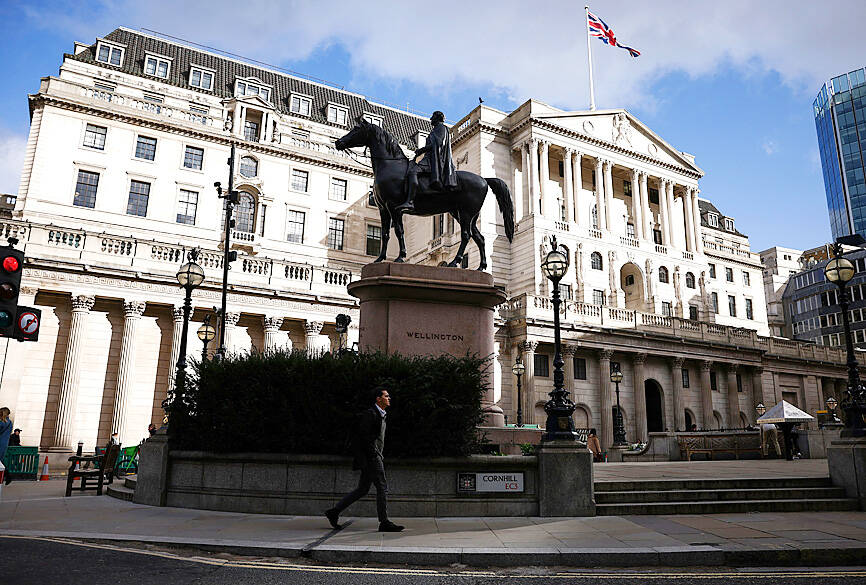The Bank of England (BOE) yesterday joined Norway and Switzerland in hiking interest rates to tackle stubbornly high inflation, although banking-sector turmoil could soon lead to a pause in US tightening as the Federal Reserve hinted.
A day after the Fed lifted US borrowing costs by 25 basis points, the BOE did the same as its key rate reached 4.25 percent — the highest level since the 2008 global financial crisis.
The Swiss National Bank (SNB), which helped oversee the buyout of troubled Credit Suisse Group AG by UBS Group AG over the weekend, lifted its rate by a hefty 50 basis points to 1.5 percent.

Photo: Reuters
Norway’s central bank raised interest rates by a more modest 25 basis points to 3.0 percent.
Policymakers remain laser-focused on fighting inflation, with the European Central Bank (ECB) last week announcing a 50-basis-point increase in eurozone borrowing costs.
The outlier among major central banks is the Bank of Japan, which steadfastly resists tightening owing to what it deems are temporary boosts to consumer prices in the wake of Russia’s invasion of Ukraine.
Following their monetary policy gatherings, the SNB said it was “countering the renewed increase in inflationary pressure,” while Norges Bank said higher rates were “needed to curb inflation.”
The BOE said “uncertainties around the financial and economic outlook have risen.”
While the Fed hiked its lending rate to 4.75 to 5.0 percent, analysts said its accompanying statement signaled it might soon pause monetary tightening.
The Fed statement replaced a previous warning that “ongoing increases ... will be appropriate” to tame inflation with a conditional one saying “some additional policy firming may be appropriate.”
Recent banking sector developments “are likely to result in tighter credit conditions for households and businesses and to weigh on economic activity, hiring and inflation,” the Fed added.
The Swiss rate call, which matched its last increase in December, comes a few days after the SNB joined other major central banks in boosting liquidity in the wake of the latest banking crisis.

The US dollar was trading at NT$29.7 at 10am today on the Taipei Foreign Exchange, as the New Taiwan dollar gained NT$1.364 from the previous close last week. The NT dollar continued to rise today, after surging 3.07 percent on Friday. After opening at NT$30.91, the NT dollar gained more than NT$1 in just 15 minutes, briefly passing the NT$30 mark. Before the US Department of the Treasury's semi-annual currency report came out, expectations that the NT dollar would keep rising were already building. The NT dollar on Friday closed at NT$31.064, up by NT$0.953 — a 3.07 percent single-day gain. Today,

‘SHORT TERM’: The local currency would likely remain strong in the near term, driven by anticipated US trade pressure, capital inflows and expectations of a US Fed rate cut The US dollar is expected to fall below NT$30 in the near term, as traders anticipate increased pressure from Washington for Taiwan to allow the New Taiwan dollar to appreciate, Cathay United Bank (國泰世華銀行) chief economist Lin Chi-chao (林啟超) said. Following a sharp drop in the greenback against the NT dollar on Friday, Lin told the Central News Agency that the local currency is likely to remain strong in the short term, driven in part by market psychology surrounding anticipated US policy pressure. On Friday, the US dollar fell NT$0.953, or 3.07 percent, closing at NT$31.064 — its lowest level since Jan.

Hong Kong authorities ramped up sales of the local dollar as the greenback’s slide threatened the foreign-exchange peg. The Hong Kong Monetary Authority (HKMA) sold a record HK$60.5 billion (US$7.8 billion) of the city’s currency, according to an alert sent on its Bloomberg page yesterday in Asia, after it tested the upper end of its trading band. That added to the HK$56.1 billion of sales versus the greenback since Friday. The rapid intervention signals efforts from the city’s authorities to limit the local currency’s moves within its HK$7.75 to HK$7.85 per US dollar trading band. Heavy sales of the local dollar by

The Financial Supervisory Commission (FSC) yesterday met with some of the nation’s largest insurance companies as a skyrocketing New Taiwan dollar piles pressure on their hundreds of billions of dollars in US bond investments. The commission has asked some life insurance firms, among the biggest Asian holders of US debt, to discuss how the rapidly strengthening NT dollar has impacted their operations, people familiar with the matter said. The meeting took place as the NT dollar jumped as much as 5 percent yesterday, its biggest intraday gain in more than three decades. The local currency surged as exporters rushed to